Helping Street Children in Honduras
They live in abandoned buildings, cardboard boxes, parks or on the street. They frequent street corners, markets, gas stations, traffic lights and fast-food chains, meddle with the garbage, or sniff glue. Without a doubt, one of the biggest concerns for the Honduran government has been the rising number of children living in the streets — a tough environment without the care and protection of a family.
Children may end up on the streets for several reasons. They may have no choice — they are abandoned, orphaned or disowned by their parents. Or they may choose to live in the streets because of mistreatment or negligence or because their homes cannot provide them with their basic needs.
The majority of street kids live in the capital city of Tegucigalpa or in the second-largest city of the country, San Pedro Sula. Most fled from homes where abject poverty, violence, alcoholism and familial disintegration are the norm. In order to survive, they steal, dig through trash, shine shoes, or do other odd jobs.
Sadly, an estimated 90 percent of them become addicted to toxic “yellow” glue and paint thinner, which is highly addictive and extremely damaging to the human body, causing kidney failure, irreversible brain damage and, in some cases, death.
The reality is that many Honduran street kids do not make it to their 18th birthday because of the dangerous living conditions that prevail in the country. (more…)
Seven Were Chosen to Serve the Needy
Compassion, which reopened its East Indonesia ministry in 2005, has brought new life to the ministry of some churches. Pastor Pangkey is one pastor who has been inspired by Compassion to begin new patterns of ministry.
He had the opportunity to take part in the Global Leadership Summit in 2007 in Jakarta. At the meeting, God asked him to challenge his congregation to open its heart more for the people in the community.
Pastor Pangkey felt that God wanted him to look to the others who haven’t yet been reached by our programs and the church. This is how he began the Stefanus Group.
“God spoke to me through the scripture in Acts 6:1-7, which speaks about the seven chosen men. The Twelve Disciples chose Stephen and six other men to be responsible for what the people needed at that time.
“We know that people who live in poverty are not only people in the past. We still meet a lot of people who live in poverty today. They can’t afford their basic needs like meals because many of them don’t have opportunity to have a job or build their own business. They have to struggle every day to fulfill their basic needs.”
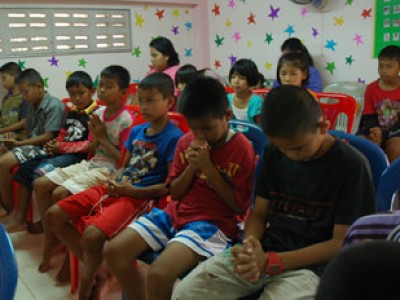
Bringing Christ to Buddhist Villagers
Mai-treejit Sawang-dandin church is located in Sakon Nakorn, a region in northeastern Thailand. It is commonly known as the barren region. Numerous people of all working ages move here to work in the big city, where they can earn a decent income to support themselves and their families.
Noppadol and Ladda Surin were a young couple who had just graduated from Bible school and had come to serve God in this area. The first time they held a Sunday service at Mai-treejit Sawang-dandin church, there were only five members in the congregation.
As they walked away from the church grounds after the service, they could see the large Buddhist temples that surrounded the community and the church. They silently prayed,
“What can we do to bring salvation to the people in this community?”
“The villagers considered Christianity a western religion, and building in-depth relationships with them was initially very difficult. Another major concern was that the villagers were strong Buddhists, and there were temples existing in every village,” explains Pastor Noppadol.
About 98 percent of the communities in Sakon Nakorn are Buddhist. Every morning it is common to see villagers waiting along the road in front of their houses to make merit by putting food into the bowls of Buddhist priests as they collect their alms for the day.
In every Buddhist ceremony, the community gathers together to celebrate for the entire day, much in the same way holidays such as Christmas are celebrated in western cultures. Everyone in the community participates in helping and preparing for the ceremony weeks in advance. The community’s collective effort ensures the ceremony is a success.
In this environment, the church needed some help to reach out to the poor and bring glory to God. Compassion provided the solution. (more…)
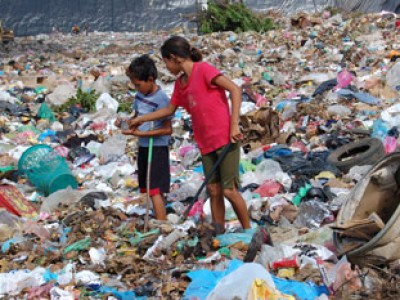
Living Off of Garbage
Garbage is everywhere. Two children and their mothers used to trudge over the piles, holding a hook to dig in garbage. They were here at the dump at 5 or 6 in the morning every day.
Nearly 150 children used to work at this dump in León, Nicaragua, looking for food and other necessities, helping their families’ financial situations by collecting recyclable material like plastic, glass and metal that could be sold later.
Juan Carlos and Fatima are two children from two different families who were part of that number.
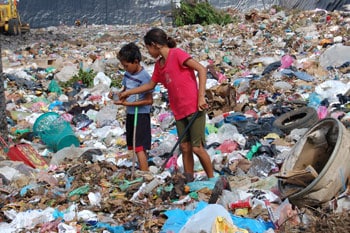
Almost every day Juan Carlos’ and Fatima’s mothers collected cans, copper and plastic bottles to sell at the end of each week. On a good week they’d get $5 to $10. The children went with them when there were no classes or activities at their child development center.
At the dump they were exposed to the hot Central American sun and an unsafe and unhealthy environment, punctuated with bad smells, flies, dirt and rotten food.
“I ask the Lord to take care of me because anything can happen at the dump. This year someone was killed in a fight for trash,” says Yolanda, Fatima’s mom. (more…)
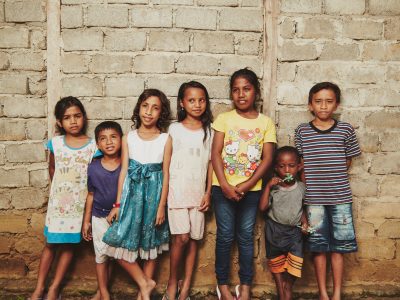
Protecting the Children in Our Program
In Indonesia, children’s rights are a critical issue — as in many countries, women and children are often the most vulnerable members of the community. Compassion Indonesia understands the urgent need to address this issue that often remains silent.
A Typical Day at a Child Development Center in Brazil
The weather is cold, and it is hard to get out of the bed. It’s 7:30 in the morning on a typical day, and despite his wanting to stay under the blankets, Renan has an appointment he wouldn’t miss for anything. 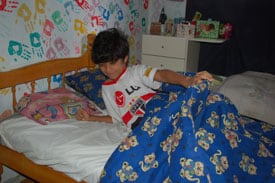
Lilian, his young mother, enters the colorful room. “Wake up!” she says.
The children’s bedroom used to be the family’s kitchen before the improvement they made after receiving a Christmas gift from her son’s sponsor: a new floor and new paint on the bedroom’s walls. The children decorated the room.
Renan stands up and starts making his bed. The boy goes to the bathroom and brushes his teeth — just like he was taught at the child development center where he is enrolled — and combs his hair.
He carefully puts on his student center uniform before leaving home with his older brother Jean, who also attends the center. The church gives each of the children a T-shirt to wear. (more…)

Christmas in Haiti
In Haiti, Christmas is widely celebrated by Christians and non-Christians alike as a holiday with non-religious aspects.
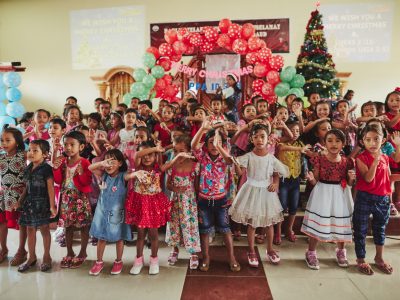
Christmas in Indonesia
One might think that celebrating Christmas in Indonesia – the world’s most populous Muslim nation – can be a problem. Even though 90 percent of Indonesia’s 220 million people are followers of Islam, it does not mean that Christmas is not celebrated.
The biggest signs of Christmas (i.e. the traditions of the Western festive season), can be seen in the malls. Most of the major stores in the larger cities like Bandung have huge Christmas trees, and restaurants tend to put on some manner of Christmas fares.
For example, the big stores have had their Christmas decorations up for weeks in anticipation of cashing in on the season. Naturally, hotels and malls cater to visitors by erecting Christmas trees ornately decorated, and “Merry Christmas” signs. Shopping hours are extended, and the seasonal specials jump out of nowhere.
There is a Christmas tree in every mall, and a man dressed in a Santa Claus suit and a white beard can be seen giving out presents to the children. It is the same in the other cities like Jakarta, where all the major department stores join in on the festive season.
One of Compassion’s partner churches in Bandung is Immanuel Baptist Church. Christmas decorations have been in place since the first week of December. A plastic Christmas tree stands by the front entrance door to welcome all the visitors; its snow-like glitter and many small butterflies on the leaves delight the small children.
Yes, the church entrance had been decorated with an artificial Christmas trees replete with pristine snow-like glittery ornaments and small butterflies – standing unaffected by the boiling tropical heat. (more…)
Angelica’s Father Is Missing
Angelica’s father is missing. The last time he’d gone astray, he was found after a few weeks, but now it’s been months. Angelica’s mother explains that her husband is mentally ill. He used to work on the farm, strong as a water buffalo.
“He just went home one day afraid of dying,” says Emma, Angelica’s mother. “After that, he kept on saying ‘they are going to kill me’ over and over until he lost all sense of reality.”
Since then, Emma took on the responsibility of raising their four children. Angelica, 6, is the youngest. Emma worked hard day and night as a house-help, earning only $25 a month, until she developed a heart ailment. (more…)
A Clean Drinking Water Lesson
The availability of clean water can be taken for granted in developed countries such as the U.S. or U.K. For people in Bangladesh, however, clean water can be scarce.
In many remote places in Bangladesh, people may never drink clean water. They suffer from waterborne diseases, which are adopted into their lives as normal.
Flying over Bangladesh, you see hundreds of rivers and canals covering the country. But most of these water sources are badly polluted and not safe for drinking or other uses.
So not only is it difficult to provide food for everybody in this impoverished country, it is even more difficult to ensure safe drinking water for the people of Bangladesh.
Haydarnashi Child Sponsorship Program has had a problem finding clean water from the very beginning. The cook had to carry drinking water for 142 children every day. He also had to carry the water for daily cooking. (more…)
AIDS Crisis in Africa: What Compassion Ghana Is Doing About It
Compassion Ghana is intensifying its fight against the spread of HIV and AIDS with Compassion’s AIDS Initiative. Among the many activities aimed at achieving this objective is education.
Florence Sena Amponsah is a Partnership Facilitator for 12 Compassion-assisted child development centers. She has been with Compassion Ghana for one year now. She is involved with a pilot program to train youths to educate their peers about HIV and AIDS.
“When children get to a certain age, around the teenage years, they tend to relate more to their peers and their siblings who are closer to them in age than they would from their parents or teachers or adults in general.
“Parents and adults have the inclination to be uncommunicative on issues concerning sex, but children get to an age where they need answers to many things happening to their bodies. When they do not get the responses they require, they turn to their peers for information.
“Most times the information shared among peers is by and large wrong and detrimental.
“Considering these facts, we believe that when the capacity of children whom we call ‘Peer Educators’ is built up by equipping then with right knowledge and correct information, then these children can carry the message across to other children, their communities, their churches and even in their schools.
“What they are learning are most of the general things they need answers to at their developmental stage, which they are not able to openly talk about.
“The Peer Educators Training is in the pilot phase for 12 child development centers, presenting two children from each. So there are 24 children involved in the pilot.
“From what I have seen so far, I can confidently say that the program is going to make a great impact. The group of children here are highly intelligent, and judging from their participation, I can tell they are learning a lot as they find the topics to be relevant to them.
“We chose HIV and AIDS as the topic for the peer educators because HIV and AIDS is a disease which is threatening Africa. It has cut across many countries, and is a problem here in Ghana.
“We have orphans, we have people who have been infected with the disease, so we are building the capacity of these peer educators to carry the message.
“They are being taught how the disease is spread so that if they know, they will make informed decisions about themselves. At least they will know how to protect themselves.
“They are also being taught the need to care for other people who have the disease to help prevent discrimination, isolation and rejection.”
AIDS Crisis in Africa: Living HIV-Positive
My name is Azalea*. I live with my daughter. She is 10, in grade four and is second in her class. So, we are two people in the family. My husband passed away several years ago after a short disease. He was suffering from a liver problem.
We eat rice, millet pastry and beans. As we are only two, I cook once a day. After breakfast, I cook and we eat the meal at noon, and in the evening I reheat the leftovers and we eat.
We are living in an urban area. We have electricity and running water in the community, but only for those who can afford it. We also have a medical center in the neighborhood. Most people sell small items to feed their families.
I discovered my daughter was HIV-positive in 2005. She was suffering from severe chickenpox. The treating doctor suggested us to take an AIDS test. We agreed, and the child was declared HIV-positive.
I do not know how she got the disease, if it was during her birth or during the blood transfusion she got when she was very little.
My daughter does not yet know she is HIV-positive, but I will surely tell her. As I do not know how she will react, I am looking for the right moment to tell her.
I am also HIV-positive, but I do not know how and when I got infected. When the doctor discovered that my daughter was HIV-positive, he encouraged me to take the test and that was how I came to know.
I was very shocked when I found out. I was asking myself how I would live with the disease and how others would react.
Four years after being declared HIV-positive, I am still asking myself the same questions. (more…)

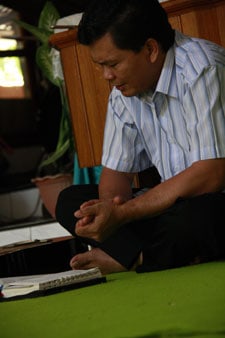 “God spoke to me through the scripture in Acts 6:1-7, which speaks about the seven chosen men. The Twelve Disciples chose Stephen and six other men to be responsible for what the people needed at that time.
“God spoke to me through the scripture in Acts 6:1-7, which speaks about the seven chosen men. The Twelve Disciples chose Stephen and six other men to be responsible for what the people needed at that time.
